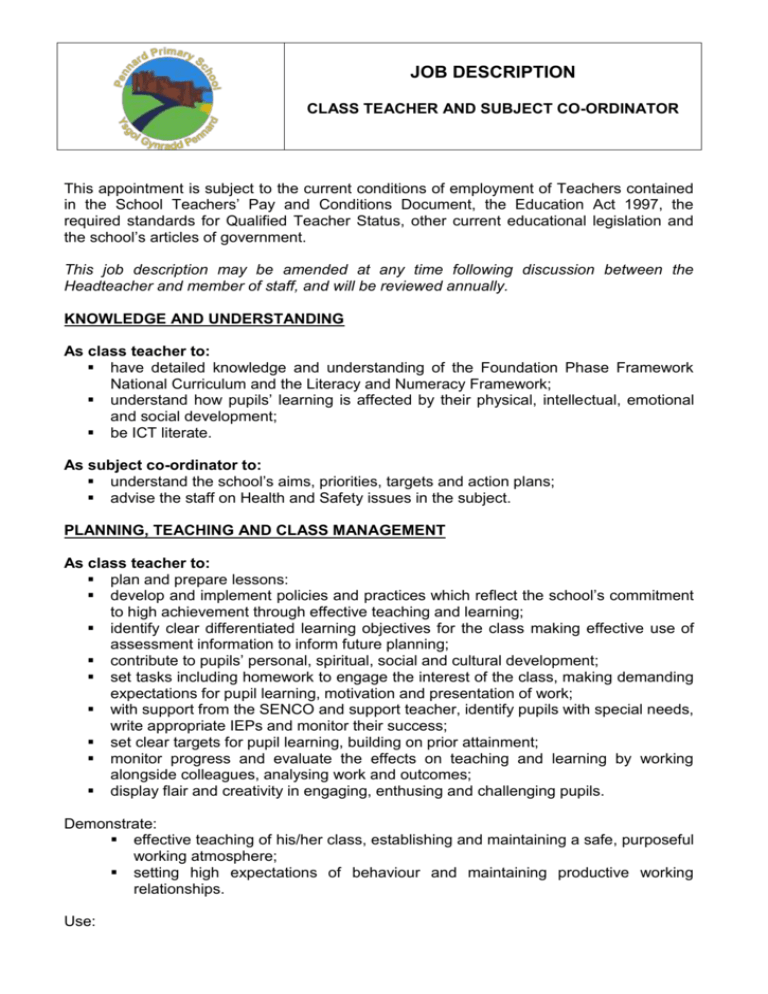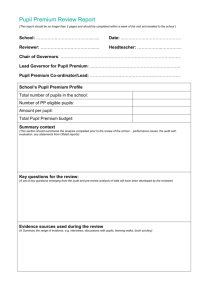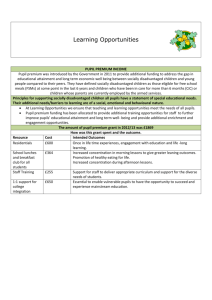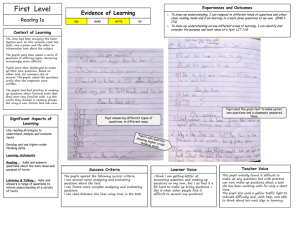JD Pennard Primary School Opens new window
advertisement

JOB DESCRIPTION CLASS TEACHER AND SUBJECT CO-ORDINATOR This appointment is subject to the current conditions of employment of Teachers contained in the School Teachers’ Pay and Conditions Document, the Education Act 1997, the required standards for Qualified Teacher Status, other current educational legislation and the school’s articles of government. This job description may be amended at any time following discussion between the Headteacher and member of staff, and will be reviewed annually. KNOWLEDGE AND UNDERSTANDING As class teacher to: have detailed knowledge and understanding of the Foundation Phase Framework National Curriculum and the Literacy and Numeracy Framework; understand how pupils’ learning is affected by their physical, intellectual, emotional and social development; be ICT literate. As subject co-ordinator to: understand the school’s aims, priorities, targets and action plans; advise the staff on Health and Safety issues in the subject. PLANNING, TEACHING AND CLASS MANAGEMENT As class teacher to: plan and prepare lessons: develop and implement policies and practices which reflect the school’s commitment to high achievement through effective teaching and learning; identify clear differentiated learning objectives for the class making effective use of assessment information to inform future planning; contribute to pupils’ personal, spiritual, social and cultural development; set tasks including homework to engage the interest of the class, making demanding expectations for pupil learning, motivation and presentation of work; with support from the SENCO and support teacher, identify pupils with special needs, write appropriate IEPs and monitor their success; set clear targets for pupil learning, building on prior attainment; monitor progress and evaluate the effects on teaching and learning by working alongside colleagues, analysing work and outcomes; display flair and creativity in engaging, enthusing and challenging pupils. Demonstrate: effective teaching of his/her class, establishing and maintaining a safe, purposeful working atmosphere; setting high expectations of behaviour and maintaining productive working relationships. Use: teaching methods which sustain the momentum of pupils’ work through stimulating curiosity, communicating enthusiasm and exploiting opportunities, analysing pupil responses in order to take their learning forward; the ability to evaluate your own teaching critically and use this to improve personal effectiveness. As subject co-ordinator to: develop strategic direction and development of your subject(s) within the context of the school’s aims and policies; know the characteristics of good teaching, leading by example, and have strategies for improving achievement in your subject(s) across the school using up to date research and inspection evidence where relevant; know where ICT can be used to aid teaching and learning and assist subject management. MONITORING, ASSESSMENT, RECORDING, REPORTING AND ACCOUNTABILITY As class teacher: to be able to use different kinds of assessments in able to record pupil progress systematically, using this information to inform future planning; to understand how National, local and comparative school data can be used to set clear targets for pupil achievement; to report pupil progress accurately to parents and other staff; establish clear targets for achievement in the subject and evaluate progress through the use of appropriate assessments and records and regular analysis of this data; evaluate the teaching of the subject by the monitoring of teachers’ plans and through work analysis, identify effective practice and areas for improvement, and take appropriate action to improve further the quality of teaching; plan lessons which identify clear differentiated objectives for the class making effective use of assessment information to inform future planning; with support from the SENCO and support teacher, identify pupils with special needs, write appropriate I.E.P’s and monitor their success. As subject co-ordinator: use comparative data to improve standards across the school by establishing benchmarks and setting targets for improvement; understand statutory requirements for your subject(s) including assessment, recording and reporting pupil progress; OTHER PROFESSIONAL REQUIREMENTS to have a working knowledge of teachers legal liabilities and responsibilities; to establish effective working relationships with everybody associated with the school; to set a good example to the pupils you teach, through your presentation and personal and professional conduct; to take responsibility for your own professional development and to keep up to date with research and developments in pedagogy and the subjects which you teach; to understand your professional responsibilities in relation to school policies and practices; to be aware of the role and purpose of the school Governing Body have an enthusiasm for the subject which motivates and supports other staff and encourages a shared understanding of the contribution the subject can make to all aspects of pupils’ lives; Operate within agreed legal and ethical boundaries when working with children. LEADING AND MANAGING Contribute to the professional development of others, including support staff Support the Headteacher by maintaining efficient and effective management of the expenditure for the subject; Take on any additional responsibilities which might from time to time be determined. SPECIFIC AREAS OF RESPONSIBILITY – to: co-ordinate and develop the following areas throughout the school: to be agreed participate in extra curricular activities; all other duties as listed in the School Teachers’ Pay and Conditions Document.











